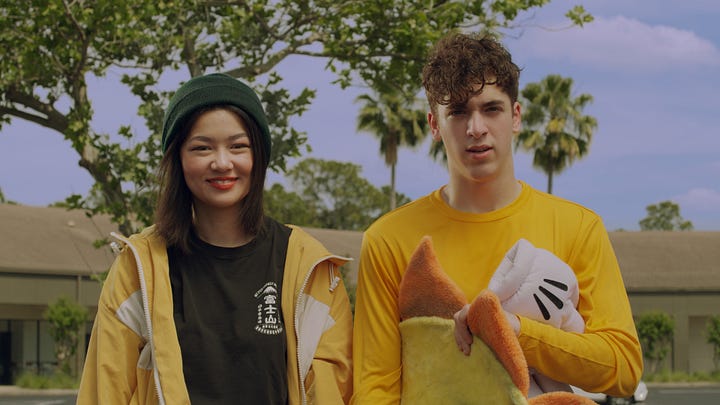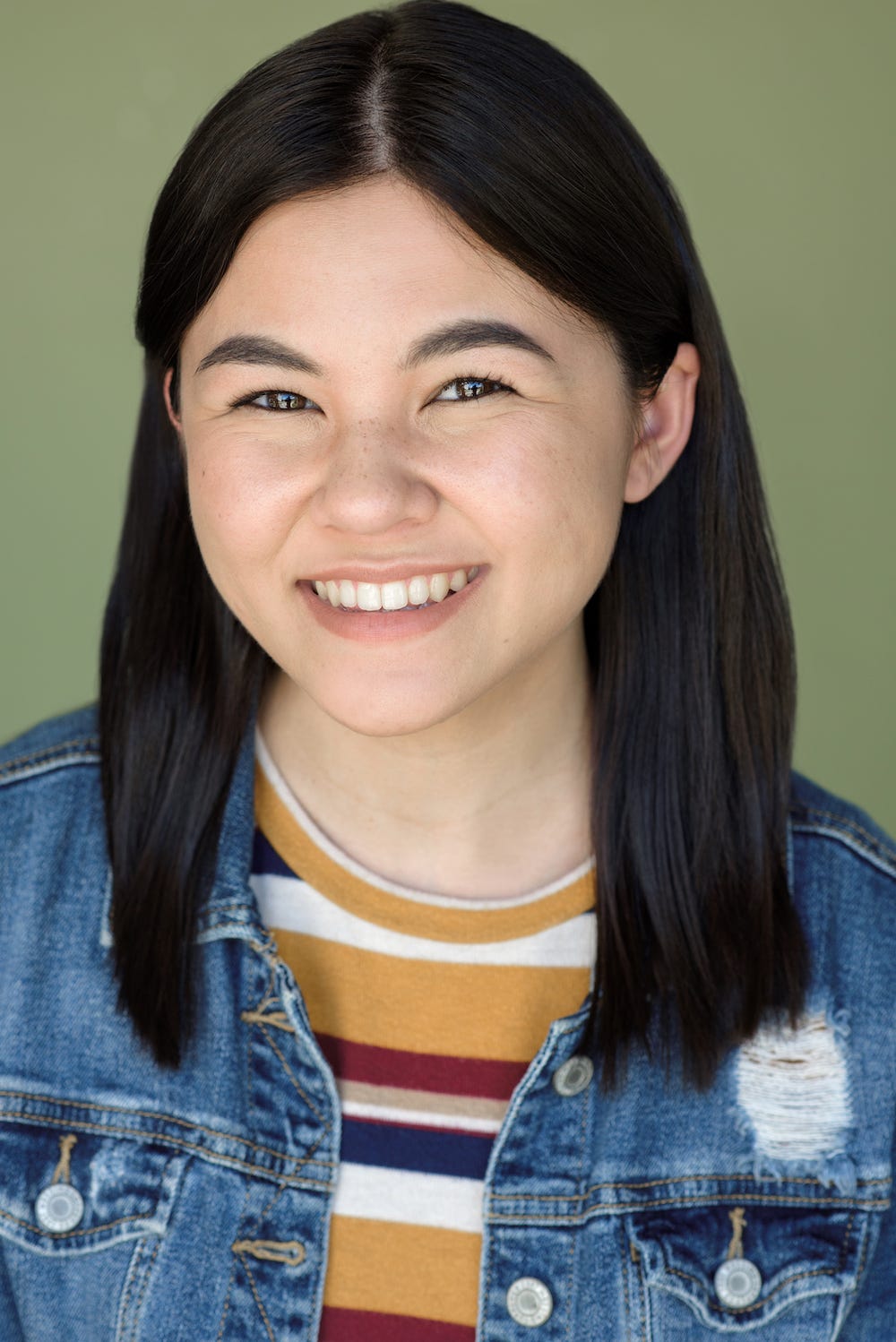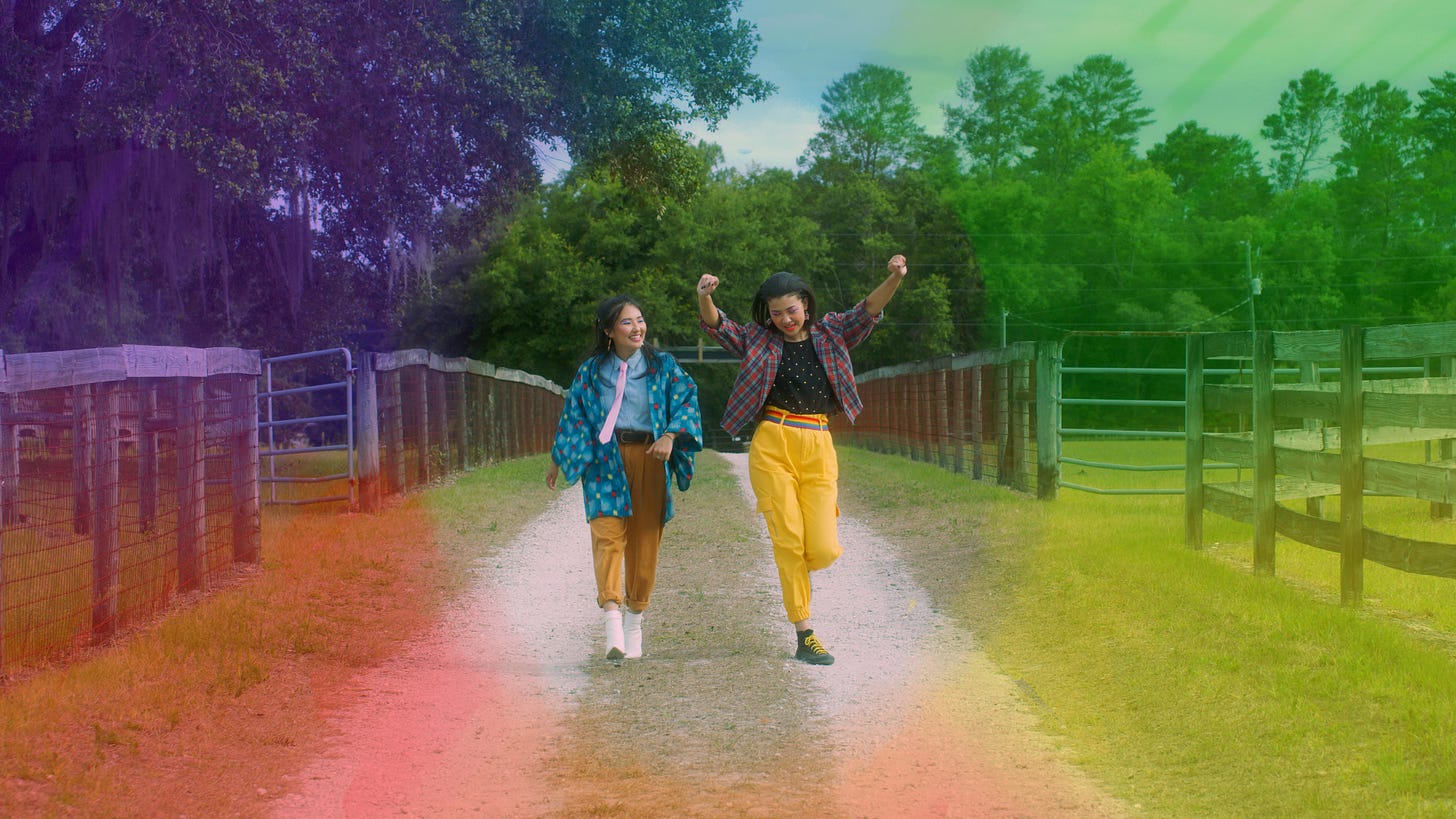Sarah Kambe Holland: “Searching for acceptance from others is always disappointing”
The director on always being a foreigner, her identity crises and her genetic predisposition to tea
Hi, welcome back to Mixed Messages! This week I’m speaking to film director Sarah Kambe Holland, who is of mixed-white British and Japanese heritage. Sarah’s latest film, Egghead & Twinkie, follows the titular characters on a road trip to meet Twinkie’s online crush after coming out to her parents. A classic teen movie with a queer storyline, Egghead & Twinkie also looks at mixedness in an authentic and relatable way. Read Sarah’s story below.
Can you tell me about your racial background?
I’m half-white British on my dad’s side, half-Japanese on my mom’s side. I tend to use mixed-race, mixed-Asian or biracial.
Has that sense of self been quite consistent throughout your life?
It’s definitely changed. I was born in Japan but spent my childhood years in Texas in a majority white community. I was always perceived as Asian, and monoracial Asian friends never said I was ‘only half’ which was cool of them.
Growing up, I would refer to myself as Asian because that’s what everybody told me I was. It was only when I got to college where it was more diverse that people told me I looked mixed. I had an identity crisis for a moment, then realised I can own both sides of my identity and be the full version of me.
As a mixed person, I don’t want to speak for full Asian people because I know that's a different experience. You don’t want to take up too much space, but our experience is valid. It’s its own full experience that we should be able to talk about without feeling bad or like we’re not enough.
Did you ever speak to your family about being mixed?
I did with my siblings. I’m grateful I grew up with them because we had such a unique experience, not just being mixed but living in two different countries. Moving to Texas was a massive cultural adjustment, but also how we were perceived changed. In Japan, we were gaijin, foreigners. We didn’t look like we fitted in. Then in the US, I was Asian.
I didn’t speak to my parents about it. There’s a mentality with the older generation, and I don’t fault them for it, but it’s like ‘this is your lot in life, there’s no need to talk about it.’ My dad, who didn’t mean any harm by it, would see it as navel gazing. He’d say ‘you should just exist in the world, why dwell on something you can’t change.’ With my dad being British as well, there were some things he couldn’t really understand because he’s brand new to the US. In the US, race is at the forefront of pretty much everything.
What was your cultural upbringing like?
I was fluent in Japanese when I was very young apparently. I was in a Japanese school, I just picked it up. But my parents were worried that if I was bilingual it might impact our English, and they knew they wanted to raise us in the US or England. When I switched to an international school I forgot all my Japanese within a year, which is a bummer. I want to try to learn Japanese again. My mom is Japanese, but she’s third-gen Japanese-American, so her upbringing was very American.
I was definitely raised with a lot of British culture from my dad’s side – when we were kids, we had hybrid British-American accents. I grew up watching Horrid Henry and Postman Pat and reading Kipper. Being British and Japanese, I’m predisposed to tea on both sides.
You mentioned that your parents didn’t want to raise you in Japan – why was that?
I have a lot of love for Japan, but a harsh truth is that it’s very homogenous. My parents were concerned we’d always be perceived as foreigners, even if we were born there, spoke the language and were culturally Japanese.
You can long to go to the country in which you were born or are from, but then you feel a bit like a fish out of water. The sad thing about being mixed is that you don’t feel fully at home anywhere until you can really accept yourself for who and what you are. You’re always trying to shove yourself as a square peg into a round hole, so you have to find that acceptance from within. I’ve found that searching for it from other people is always disappointing.
Egghead and Twinkie is such a wonderful film – how did you use your own experiences to build those characters?
It’s such a light-hearted movie that there was a part of me that didn’t want this sub-narrative [of race] in the movie to feel shoehorned in. I introduced the character of Jess for two reasons – firstly, I wanted Twinkie to meet her to dispel this weird idea that Asian people don’t live in the South.
Secondly, Twinkie is very alone at the beginning of the movie. She can’t talk to her adopted parents about her racial identity, Egghead wouldn’t understand, so it was important for her to meet someone like Jess.


Jess makes a comment about Twinkie ‘looking mixed’ – is that something you’ve experienced?
That’s happened to me, Twinkie’s moment of being called into question. I was always perceived as Asian and struggled with that. When you’re young, you just want to fit in with everyone else. In the last few years of high school, I started to embrace it. Then I came to college and people told me I looked mixed – I had a second identity crisis. It took me so long to be happy with being Asian and comfortable with myself, and now these people are saying I’m not Asian enough!
Jess doesn’t mean anything when she makes that comment to Twinkie, she’s just making conversation. That’s most people’s intentions. But for Twinkie, it calls her whole identity into question.
What’s your take on Twinkie calling herself Twinkie? Is it a defence mechanism, or reclaiming the term?
I was a bit nervous about having her called that. On the surface, it’s terrible. In the opening scene of the movie, her dad says it’s awful, but doesn’t ask her why she’s calling herself this, he just dismisses it. I think that’s the problem, she has no dialogue with her parents or language to explain where she’s coming from. Why she calls herself Twinkie only comes out when she’s comfortable with Jess.
It’s a nuanced thing, but I think it’s more of a defence mechanism, she’s trying to empower herself. If she calls herself Twinkie, she’s taking the power back from people that could use it against her as an insult. It probably seems problematic on the surface, a mixed person calling themselves a Twinkie, but I wanted to shine a light on the ways we cope. She feels so alone, this world has been weaponised against her.
Can you sum up your mixed experience in a word?
My answer would have changed drastically depending on the time in my life. I’d say unique, because whenever I talk to anybody about being mixed there’s a lot to explain and a lot of layers. I do feel that no two mixed people’s experiences are the same.
Watch Egghead & Twinkie at the Bristol Queer Vision Film Festival on June 25th, and check the website for future screenings. Don’t forget to follow the film on TikTok. Next week, I’ll be speaking to actress Sabrina Jie-A-Fa, who plays Twinkie in Egghead & Twinkie. Subscribe to get Mixed Messages in your inbox on Monday.
Enjoy Mixed Messages? Support me on Ko-Fi! Your donations, which can start from £3, help me pay for the transcription software needed to keep this newsletter weekly, as well as special treats for subscribers. I also earn a small amount of commission (at no extra cost to you) on any purchases made through my Bookshop.org affiliate links.
Mixed Messages is a weekly exploration of the mixed-race experience, from me, Isabella Silvers. My mom is Punjabi (by way of East Africa) and my dad is white British, but finding my place between these two cultures hasn’t always been easy. That’s why I started Mixed Messages, where each week I’ll speak to a prominent mixed voice to delve into what it really feels like to be mixed.







